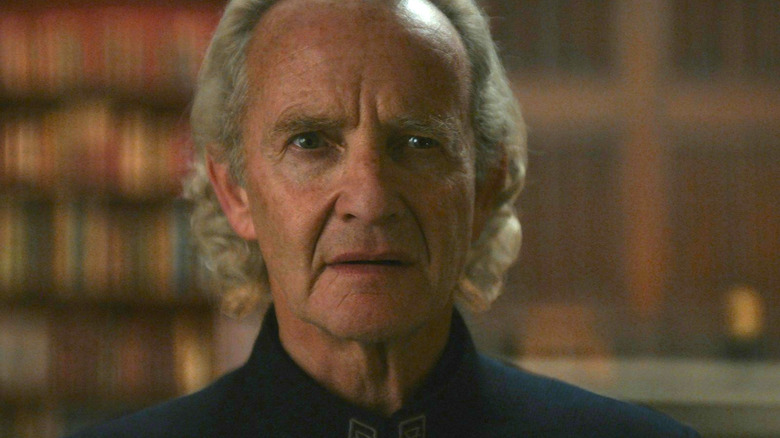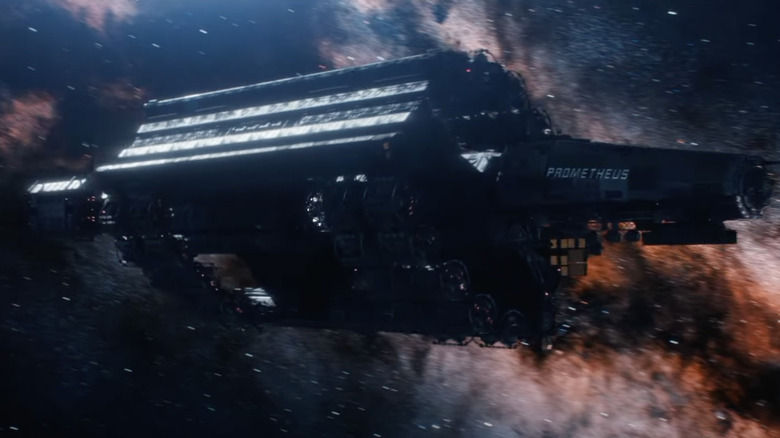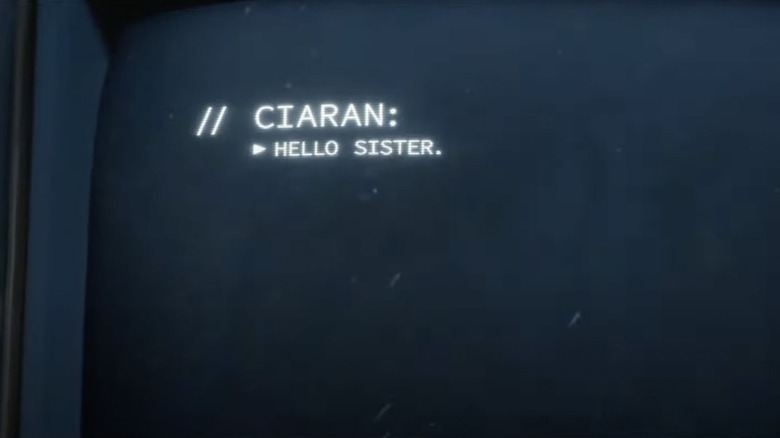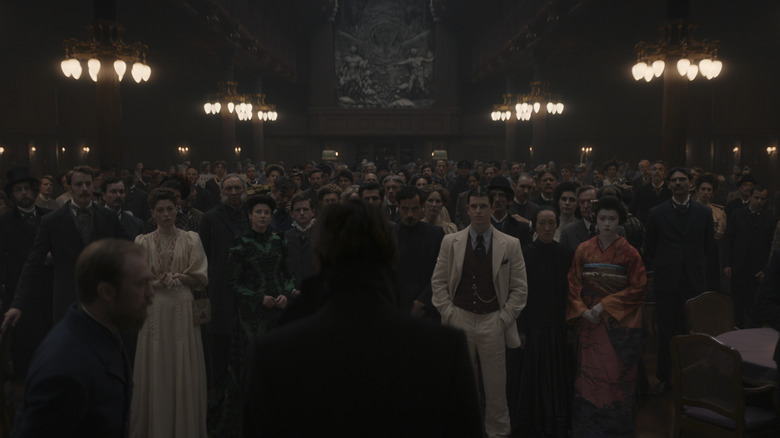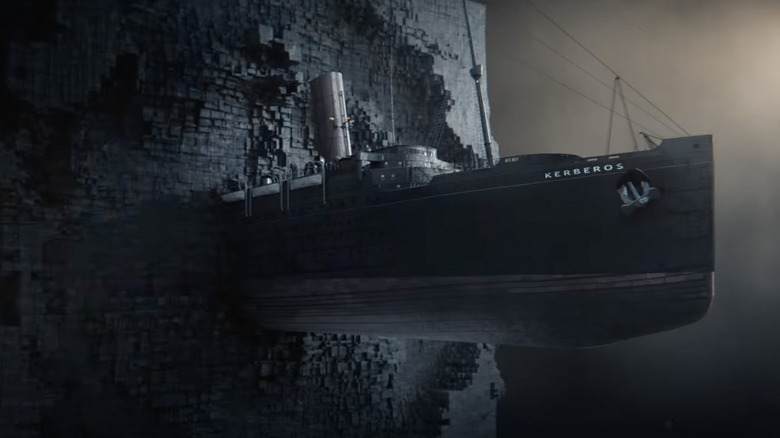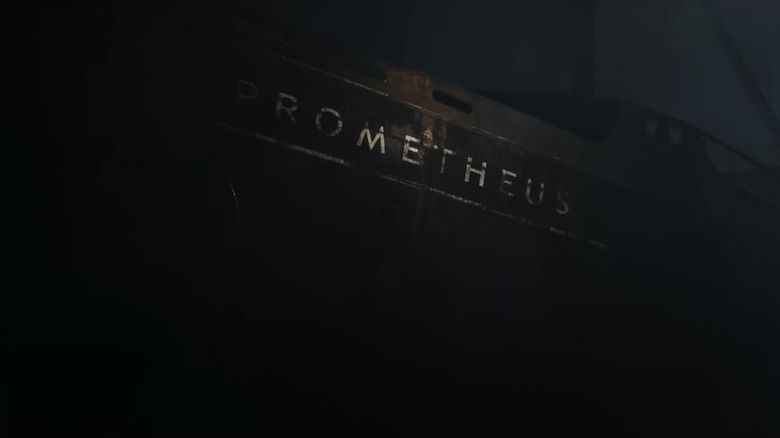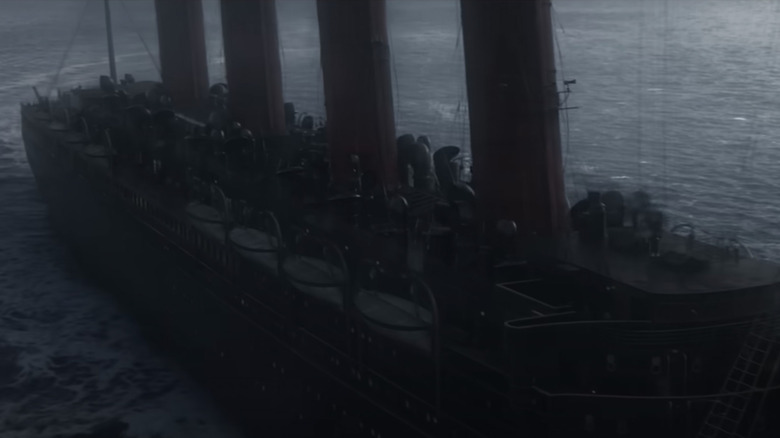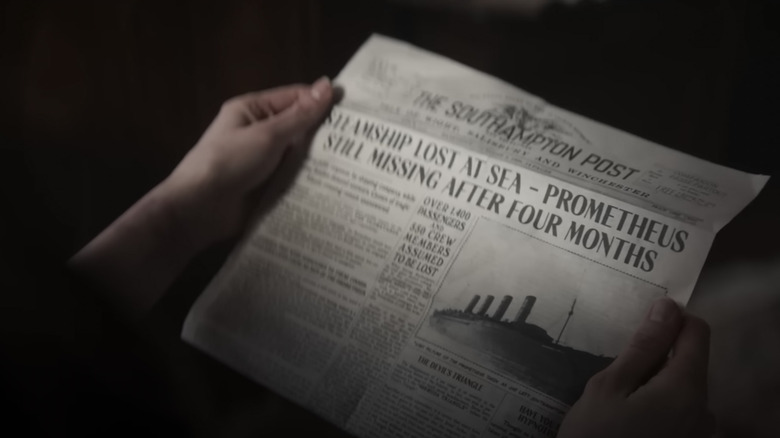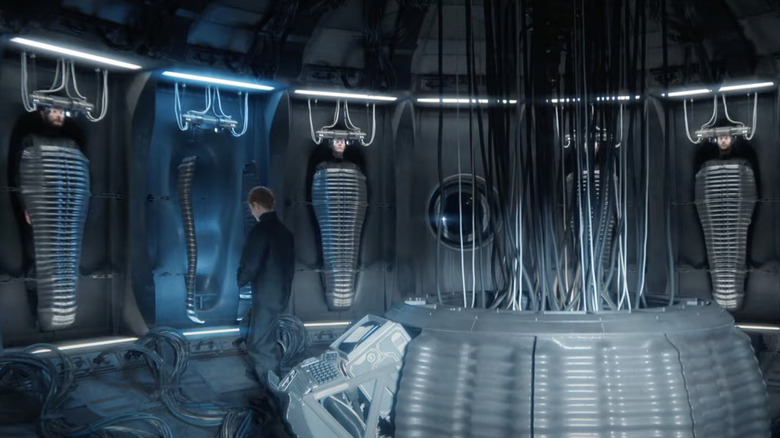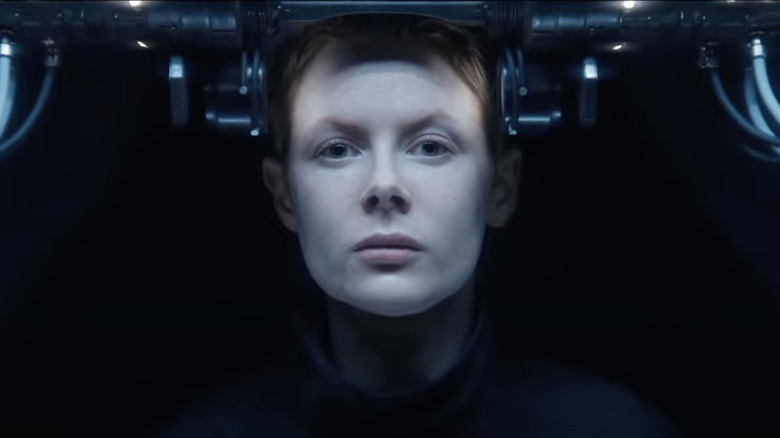The Ending Of Netflix's 1899 Explained
Brought to you by the makers of the hit Netflix sci-fi series "Dark," "1899" is a show that appears to be a period mystery-horror series that gradually unveils itself to be a blend of various other genres thanks to its mind-bending story and trippy visuals. On the whole, it contains enough twists and turns to keep the heads of viewers spinning for days. The multilingual show follows passengers of the ship Kerberos at the turn of the 19th century who find themselves in the midst of supernatural happenings after stumbling across the Kerberos' sister ship Prometheus, which was believed lost at sea four months prior.
Part of what makes the story of "1899" so potentially confusing is not just its intricate and complex plot where each question acts like a loose thread that unravels and presents even more questions — but also the show's extensive exploration of social and philosophical themes through its characters, plot developments, and historical context. As with any other television series, the resolution from the finale episode of "1899" carries certain revelations and answers to questions that have been increasingly hanging over the heads of viewers throughout the eight-episode run. These revelations pose many more questions and implications that would make any network executive giddy with the prospects of a second season, and quite possibly a franchise. By all means, hop onboard as we explain the ending of "1899," what all of the overt and covert symbolisms and allegories mean, and where our characters are headed next.
Spoilers incoming!
We're gonna need a bigger boat
Because the show is almost entirely set on the Kerberos ship, "1899" continuously evokes the feeling of claustrophobia. The passengers are forced to spend several days in close quarters on a metal ship at sea, surrounded by people they're not too fond of. Add that feeling to the fact that more and more passengers mysteriously die from what they believe to be a curse emanating from the hollow Prometheus ship the captain of the Kerberos decides to tow back to Europe (where most of the passengers are fleeing from) and you have yourself a mutiny.
The mutiny is led by Captain Eyk Larsen's right-hand man Franz, who rallies the third-class passengers of Kerberos and holds Eyk hostage. Some of the passengers on the ship resist the mutiny and work to rescue the captain. They also side with the captain and Maura in defending the Boy from the mutineers, who are all intent to cast the Boy overboard because they believe he's the source of the curse.
This divide between the mutineers and the captain's loyalists comes to a screeching halt when a ticking noise hypnotizes majority of the Kerberos' passengers into jumping off the ship to their deaths. The remaining handful of survivors work together to ensure that the Kerberos finishes its voyage to America, splitting various tasks among themselves. A black metallic protuberance eventually takes over the entire ship and slowly encircles each of the survivors until they are able to escape through portals that drop them at a location from their past. The finale reveals that all these characters are trapped in a simulation without their knowledge — which further justifies their looming sense of claustrophobia — and their real bodies are suspended on a spaceship in the year 2099. Imagine the mayhem that would break out once the characters found themselves in the even smaller confines of a spaceship.
Maura finally finds Ciaran
Maura is introduced in the show's first episode as a passenger on the Kerberos who's on a quest for her missing brother Ciaran. She receives an envelope containing a newspaper headlined "Prometheus Still Missing After Four Months," along with a cryptic message suggesting that the letter was sent to her by her brother, especially since he was a passenger aboard the Prometheus at the time it vanished. Additionally, the letter contains instructions for Maura to travel to New York, claiming that Ciaran discovered information concerning their father that could only be shared in person. Even when Maura experiences visions of being in an asylum and being sedated under her father Henry's orders, she frequently asks about her brother's whereabouts, which casts Henry as the series' ostensible evil mastermind.
Ultimately, when Maura is awakened into her very first simulation with her husband Daniel, Daniel reveals that Maura's brother Ciaran is the one who runs the ship (pun intended) on the simulations. It is also revealed that the other Kerberos passengers received similarly enigmatic letters placing them on the ship bound for America, all of which could have also been orchestrated by Ciaran. The simulation ends, and Maura wakes up alone to find herself in a spaceship surrounded by Kerberos passengers who are still under the simulation. She has her first contact with Ciaran, although not in person. Ciaran initiates a dialogue with Maura through a text on a computer screen, welcoming her to "reality." This raises the question whether Ciaran is a human running the show from behind a computer, or some sort of artificial intelligence that has retained the consciousness of Maura's brother, kind of like the MCU's Arnim Zola who was revealed to have transferred his consciousness onto a supercomputer in "Captain America: The Winter Soldier."
The friends we made along the way
Throughout the series, there is always some tension among the passengers on board the Kerberos ship. The majority of them have diverse backgrounds, speak various languages, are segregated from one another based on their social and economic strata, hold divergent beliefs, or are simply wary of those around them. This tension reaches its crescendo when the Kerberos' captain decides to tow the ostensibly cursed Prometheus ship back to Europe — a decision that prompts a mutiny among many of the passengers.
Towards the climax of the season, a number of supernatural events occur that result in only a few survivors remaining on the Kerberos, forcing each character to put aside their differences and cooperate once they realize they are all in the same boat (pun intended again). Some of the passengers who were previously at odds with one another end up helping each other, like when Jérome ties up Lucien and his fiancée Clémence to stop them from jumping off the ship after they hear the hypnotizing ticking noise, or when Franz gives his life to save the pregnant Tove when the Kerberos is sinking.
Even though most of them speak different languages and frequently have difficulty understanding one another through words, they seem to develop a deeper connection where communication seems to transcend the limitations of language — the most notable example being the romance that blooms between Chinese refugee Ling Yi and Polish fuel stoker Olek, who seem to feel what the other person wants to convey even when they may not literally understand it.
What do the White Rabbit intro theme and Plato's Cave signify?
The show has kept audiences engaged with several themes expertly woven into its premise and plot. This collection of concepts includes migration, class disparities, and gender discrimination. In the end, all of these ideas are revealed to be microcosms of a much larger theme — existentialism and creationism. You wouldn't be wrong to think that "1899" reminds you quite a bit of sci-fi classics like "The Matrix," "The Truman Show," and "Inception," given that the Netflix show has many plot elements, as well as philosophical ideas and themes, in common with these films.
The theme song for the show's intro is a cover of Jefferson Airplane's "White Rabbit" by Eliot Sumner, and the first episode's ending plays the original Jefferson Airplane song. In the literary classic "Alice's Adventures in Wonderland," the titular Alice is guided by a white rabbit into a rabbit hole that leads her into a fantastical world. Similarly, the use of the song in the ending of Episode 1, alongside the introduction of the Boy in the empty Prometheus ship, evokes a similar feeling of being led down a rabbit hole that takes both the show's characters and its audiences into a fantasy world.
In addition to social and geopolitical allegories (such as Brexit), the show also uses a number of philosophical allegories. One such example is the frequent mention of "Plato's cave," an allegory that contrasts the concepts of belief and knowledge. The allegory centers on a group of prisoners who realize that they have been living in a false reality all of their lives and are given the option of accepting the knowledge that there is a larger reality outside the uncomfortable but familiar and reassuring cave they live in (via StudioBinder). Similar to this, Maura in the show encounters this dilemma after learning that she is trapped in a simulation.
The meaning behind the ship names
Given the amount of Easter eggs, allegories, and subtle details that "1899" contains, it would take even the most eagle-eyed viewers a lot of time and energy to catch and analyze them all. The most obvious Easter eggs appear to be the names of the two ships central to the premise of the show that tease some hidden meanings within the context of the series.
The show confines its pan-European characters on a ship called "Kerberos." In Greek mythology, Cerberus (from which the name "Kerberos" is derived) is the name of a multi-headed watchdog who serves Hades (the god of the dead) by guarding the gates of the underworld to prevent the dead from leaving. In the show, it is discovered that the ship Kerberos performs a similar function of preventing its passengers from leaving the simulation they are suspended in without their knowledge.
The other ship of importance is the Prometheus, which is revealed to be the predecessor of the Kerberos simulation. In Greek mythology Prometheus defies the gods, steals their fire, and gives it to humanity, enabling mankind to construct its own civilizations. Zeus sentences Prometheus to an endlessly excruciating punishment in the form of tying him to a rock and making an eagle devour his liver every day (via Britannica). Similar to this, the characters in "1899" are trapped in a cycle and loop of repeated simulations and go through a number of tribulations while traveling on the Prometheus and the Kerberos.
European migrant crisis and Brexit allegories
At face value, the premise of "1899" centers on European and Asian migrants and refugees of diverse origins who are onboard the Kerberos ship charted to America, all of whom are revealed to be running away from one thing or another. This gives way to a social commentary on the European migrant crisis and other thematic explorations that makes the story and its characters contemporarily relevant in spite of the show's apparent eponymous time setting. The migrant crisis in Europe began in 2015 when massive numbers of refugees from war-torn countries including Syria, Afghanistan, Iraq, and Pakistan came to the continent in search of asylum. In an interview with Deadline, the show's creators, Jantje Friese and Baran bo Odar, cited the crisis as an inspiration for the show's premise, which follows the passengers of Kerberos migrating from Europe to America.
Additionally, the duo cited the Brexit situation in their decision to have the show be multi-lingual with a pan-European cast and crew. Odar explained, "It really had to be a European collaboration, not just cast but also crew. We felt that with the past years of Europe being on the decline, we wanted to give a counterpoint to Brexit, and to nationalism rising in different countries, to go back to that idea of Europe and Europeans working and creating together." The influence and intent are evident in the series — every passenger of the Kerberos goes through trying circumstances that force them to overcome their linguistic, ideological, and class differences, and unite against the growing threat of the unknown.
Who is the Creator?
As the series progresses, the plot becomes increasingly complex and nuanced to the point where it's unclear who is to blame for all the bad things that are happening to the characters. At one point, the Boy that Eyk and Maura find in the Prometheus ship namedrops a certain "Creator" character, who is hinted at being the antagonist of the series from whom the mysterious Boy and the enigmatic Daniel are hiding from. Gradually, it becomes clear that the characters are in a simulation, which explains all the reality-shattering events that Maura experiences, such as the tunnel under her bed that houses a portal to a mental asylum. Maura suspects that her father Henry is the eponymous "Creator" of the simulations, given that Henry has always been fascinated by human psychology and would be likely to conduct such experiments.
However, Henry turns out to be merely a red herring of an antagonist once he reveals to the Boy, aka Elliot (Maura's son) that he too is a victim of the simulations. Henry believes that Maura is the "Creator" who has imprisoned him and the other characters in the simulation along with an artificial construct of her son Elliot in an attempt to keep the boy alive. Daniel, Maura's husband, later confirms that Henry is also trapped in the simulation, revealing to Maura that it is, in fact, her brother Ciaran who is the ominous "Creator." Maura wakes up from the simulations and finds herself in a spaceship named Prometheus where she finally encounters Ciaran through a text on a computer screen that reveals the current year to be 2099.
What the show's (literal) future holds
As the title suggests, "1899" starts off as a story that's set in the eponymous year just before the turn of the 19th century. However, as the show progresses, certain events transpire that cast suspicion on the show's title itself. The series' second episode ends with a shocking reveal that every passenger on the Kerberos ship is being monitored through several computer screens, the image of which disorients viewers from the time period in which the show is supposedly based. Additional elements are introduced, such as Daniel's sliding puzzle device that wirelessly controls the simulation's mainframe, and the notion that the characters are trapped in a computer simulation, all of which further propels the shift of the series' genre from being a historical-period mystery to being a science-fiction thriller.
This shift reaches a dramatic conclusion at the end of the season finale when Maura wakes up to find herself in a spaceship surrounded by the passengers of Kerberos who are placed under suspended animation, still trapped in the simulation. The date is revealed to be October 19, 2099, which is a full two centuries after the titular time period of the show. It's possible that the show up until now has explored the first layer of the simulation that is 1899 and the ending sets up a possible second season (and a second layer of the simulation) that could take place in the futuristic setting of 2099.
When does 1899 Season 2 air?
Even a week after its premiere, "1899" managed to stay on Netflix's "Top 10" list after having topped the streaming platform's viewership rankings (per Tom's Guide). Add that to the positive reviews that the show has received and its cliffhanger-filled finale that demands some sort of continuation, one could assume that a second season is almost certain. Why "almost?" Despite how well-received they were by audiences and critics alike, Netflix has abruptly canceled a number of its ongoing original series in recent years ("GLOW," "Chilling Adventures of Sabrina") without allowing these shows to finish their stories with a final season (via Decider). This includes shows that were axed just after only one season such as "Tuca & Bertie" and "Julie and the Phantoms," which makes us fear that "1899" might share a similar fate.
While Netflix has yet to greenlight a second season to "1899" as of this writing, the show's creators Jantje Friese and Baran bo Odar have confirmed that they do have a roadmap of the story charted until a potential third (and final) season. Co-creator Odar explained to IndieWire, "Season 1 is about establishing a big theme, a big thing. Let's see if there's a Season 2, and then we'll start playing with that theme, and have a resolution ideally in third season. Again it's, like 'Dark,' meant to be told in three seasons." We can only hope that the show gets to reach its natural end without being struck down and left to sink by Netflix.
